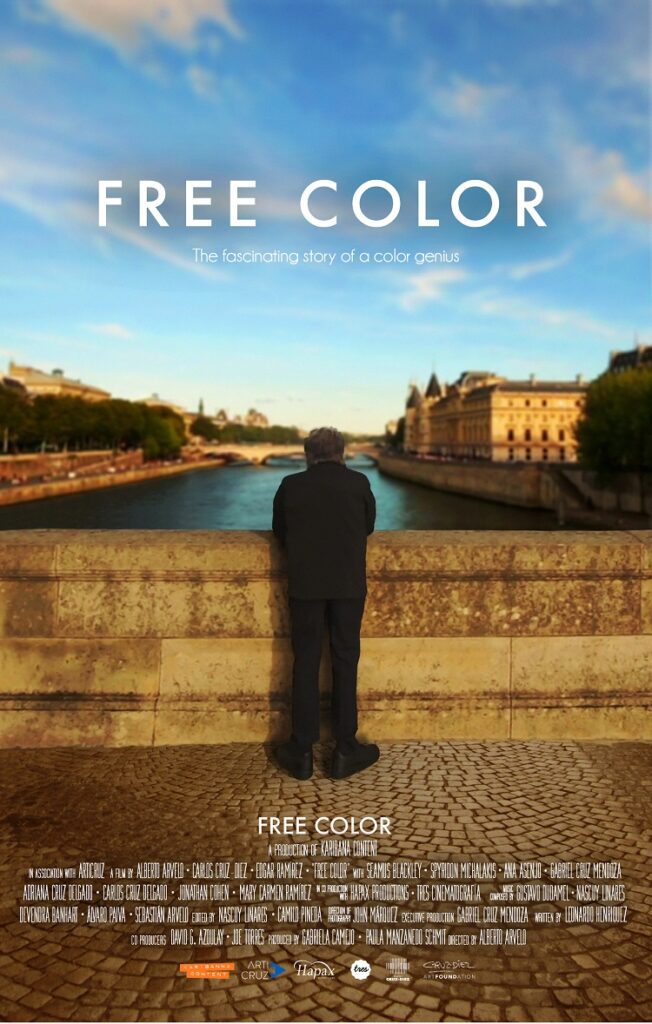
Written by Ram Venkat Srikar
I’ve always wondered how individuals feel after reaching a peak of success in their respective fields, I mean, don’t the tremendous achievements create a sense of satisfaction leading to fulfilment? If not, then I have to change the way I look at success and its fruits.
It takes some time to get familiar with the vibe it creates, but after its opening moments, Free Color profoundly replicates the art form, which the film’s subject and artist, Carlos Cruz-Diez, dreams to create. Now, we have only seen color being a part of an art form. In painting, color decorates, creates a mood, or expresses an emotion. Same applies for (good) films. Each color has a distinct emotion; red implies anger/danger/power, pink goes with beauty/feminity/sweetness, green for nature, and blue for coldness and isolation are some I’m aware of. But, all these only bolster the art piece, it only gives a texture; art still exists without the color. It doesn’t have a form of its own. And that is what the film’s subject Carlos Cruz-Diez want to, free the colors; it is evident where the title originates from.
Alberto Arevalo’s documentary follows Carlos Cruz-Diez, Venezuelan-born artist, who at 94, sets out to achieve something unseen and unheard of in the artist community. He recruits a team of people for his dream project – to give colors their own form without shape or the necessity to uphold any other component – which has to a perfect marriage of art and science. Many may find the matter less than exciting, but like Carlos says, “everyone watching a film might have a different perspective”, and this stands true for art no matter what form it takes. As a group of colors with no form, the film is intentionally presented without a precise structure. We all have seen clothes and wallpapers which have lines in different colors, they look fascinating but also cause discomfort simultaneously. But as a whole, they are in a pattern, like a film. Split into chapters, each individual chapter won’t stand out, but together they paint a complete picture. Despite not having a structure, the documentary is not avant-garde like Carlos’ project; it still retains conventional documentation tactics so that the film becomes quite easily consumable. And I liked the way it is, a neatly presented, beautifully shot film about an experimental project. An experimental outtake on an experimental art project could have been catastrophic; thankfully, that’s not the case here. Unlike maths, two negatives don’t become positive in cinema.
It’s pleasing how authentic the visuals are. I strongly feel the filmmaker refrained from employing color grading/correction because it’s a way of respecting the true beauty of the color, instead of manipulating it in the name of beautification. Also, the ability of the film to hook the viewer to the colors on the screen, even without focusing on them, speaks that the filmmaker successfully conveyed what the film is actually about. It took me 10 minutes to find the focal point. But after I did, it immersed me into the journey of the man. Despite all the conversations about color, we see Carlos being interviewed in a not so colorful setup. It’s grey, to be precise even though it appears colorless. While there a deep conversations happening about color, the prick inside me thought, it’s funny people with color blindness can never empathize with the film, simultaneously, the human inside me felt sad for people with color blindness can never feel the color. But hey, even black and white are colors, backs up Carlos, adding that there isn’t anything colorless in this world, I nodded. I assume the prick and human inside me are black and white!
As I come to an end, I realize this has been more of a personal response to the film as opposed to a critical analysis. But such is the film. It’s a life. And who am I to play be a critic of someone’s life? Having a positive outlook and learning something from a person’s life is ideal, and I did learn something. Keep your dreams alive and strive to make them a reality, even when you are a celebrated personality at 94. And none of this is underlined because true art is the one that lets you choose the story that you want to see. In that case, Free Color is art, a pure form of it.